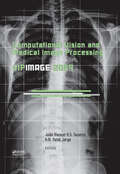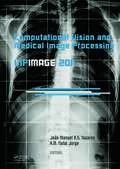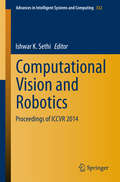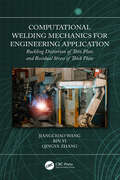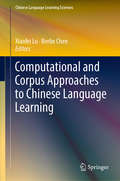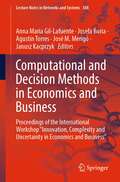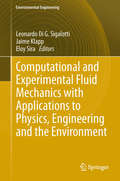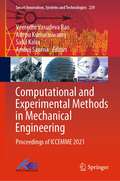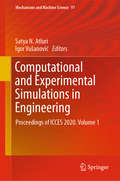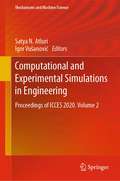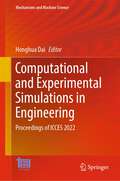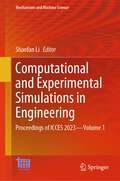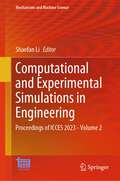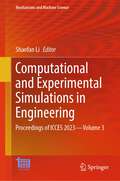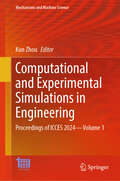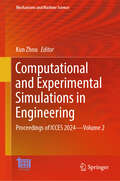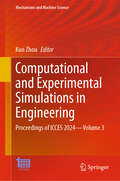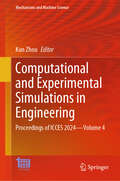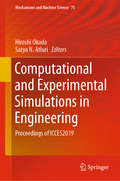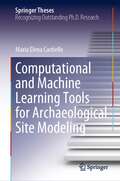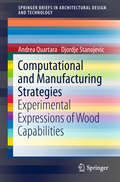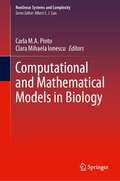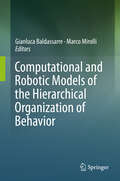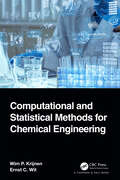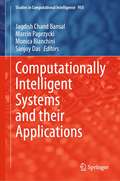- Table View
- List View
Computational Vision and Medical Image Processing: VipIMAGE 2009
by João Manuel R.S. Tavares & R.M. Natal JorgeComputational Vision and Medical Image Processing, VIPIMAGE 2009 contains the full papers presented at VIPIMAGE 2009 - Second ECCOMAS Thematic Conference on Computational Vision and Medical Image Processing, held in Porto, Portugal, on 14-16 October 2009. International contributions from twenty countries provide a comprehensive coverage of the curr
Computational Vision and Medical Image Processing: VipIMAGE 2011
by João Manuel R.S. Tavares R.M. Natal JorgeThis book contains invited lecturers and full papers presented at VIPIMAGE 2011 - III ECCOMAS Thematic Conference on Computational Vision and Medical Image Processing (Olh Algarve, Portugal, 12-14 October 2011). International contributions from 16 countries provide a comprehensive coverage of the current state-of-the-art in: Image Processing
Computational Vision and Robotics: Proceedings of ICCVR 2014 (Advances in Intelligent Systems and Computing #332)
by Ishwar K. SethiComputer Vision and Robotic is one of the most challenging areas of 21st century. Its application ranges from Agriculture to Medicine, Household applications to Humanoid, Deep-sea-application to Space application, and Industry applications to Man-less-plant. Today's technologies demand to produce intelligent machine, which are enabling applications in various domains and services. Robotics is one such area which encompasses number of technology in it and its application is widespread. Computational vision or Machine vision is one of the most challenging tools for the robot to make it intelligent. This volume covers chapters from various areas of Computational Vision such as Image and Video Coding and Analysis, Image Watermarking, Noise Reduction and Cancellation, Block Matching and Motion Estimation, Tracking of Deformable Object using Steerable Pyramid Wavelet Transformation, Medical Image Fusion, CT and MRI Image Fusion based on Stationary Wavelet Transform. The book also covers articles from applications of soft computing techniques such as Target Searching and Tracking using Particle Swarm Optimization, PSO-based Functional Artificial Neural Network, etc. The book also covers article from the areas of Robotics such as Solar Power Robot Vehicle, Multi Robot Area Exploration, Intelligent Driving System based on Video Sequencing, Emotion Recognition using MLP Network, Identifying the Unstructured Environment.
Computational Welding Mechanics for Engineering Application: Buckling Distortion of Thin Plate and Residual Stress of Thick Plate
by Jiangchao Wang Bin Yi Qingya ZhangComputational Welding Mechanics for Engineering Application: Buckling Distortion of Thin Plate and Residual Stress of Thick Plate deals with two special issues in the field of computational welding mechanics: buckling distortion of thin plate and residual stress of thick plate. Through experiment, theory, and computational analysis, the authors systematically introduce the latest progress and achievements of computational welding mechanics, such as weld buckling in lightweight fabrication and residual stress in HTSS thick plate welding. In addition, they also explore its application to address real-world engineering problems in advanced manufacturing, such as precision manufacturing and mechanical performance evaluation. The book will be of interest to scholars and engineers of computational welding mechanics who wish to represent the welding mechanics response, predict the distribution and magnitude of mechanical variables, or optimize the welding technique to improve the manufacturing quality.
Computational and Corpus Approaches to Chinese Language Learning (Chinese Language Learning Sciences)
by Xiaofei Lu Berlin ChenThis book presents a collection of original research articles that showcase the state of the art of research in corpus and computational linguistic approaches to Chinese language teaching, learning and assessment. It offers a comprehensive set of corpus resources and natural language processing tools that are useful for teaching, learning and assessing Chinese as a second or foreign language; methods for implementing such resources and techniques in Chinese pedagogy and assessment; as well as research findings on the effectiveness of using such resources and techniques in various aspects of Chinese pedagogy and assessment.
Computational and Decision Methods in Economics and Business: Proceedings of the International Workshop “Innovation, Complexity and Uncertainty in Economics and Business” (Lecture Notes in Networks and Systems #388)
by Anna Maria Gil-Lafuente Janusz Kacprzyk José M. Merigó Josefa Boria Agustín TorresThis book presents different topics related to innovation, complexity, uncertainty, modeling and simulation, fuzzy logic, decision-making, aggregation operators, business and economic applications, among others. The chapters are the results of research presented at the International Workshop "Innovation, Complexity and Uncertainty in Economics and Business", held in Barcelona, in November 2019, by The Ibero-American Network for Competitiveness, Innovation and Development (REDCID in Spanish) and the Royal Academy of Economic and Financial Sciences (RACEF in Spanish). These papers are useful for junior and senior researchers in the area of economics and business.
Computational and Experimental Fluid Mechanics with Applications to Physics, Engineering and the Environment (Environmental Science and Engineering)
by Leonardo Di G. Sigalotti Jaime Klapp Eloy SiraThe book presents a collection of selected papers from the I Workshop of the Venezuelan Society of Fluid Mechanics held on Margarita Island, Venezuela from November 4 to 9, 2012. Written by experts in their respective fields, the contributions are organized into five parts: - Part I Invited Lectures, consisting of full-length technical papers on both computational and experimental fluid mechanics covering a wide range of topics from drops to multiphase and granular flows to astrophysical flows, - Part II Drops, Particles and Waves - Part III Multiphase and Multicomponent Flows - Part IV Atmospheric and Granular Flows - and Part V Turbulent and Astrophysical Flows. The book is intended for upper-level undergraduate and graduate students as well as for physicists, chemists and engineers teaching and working in the field of fluid mechanics and its applications. The contributions are the result of recent advances in theoretical and experimental research in fluid mechanics, encompassing both fundamentals as well as applications to fluid engineering design, including pipelines, turbines, flow separators, hydraulic systems and biological fluid elements, and to granular, environmental and astrophysical flows.
Computational and Experimental Methods in Mechanical Engineering: Proceedings of ICCEMME 2021 (Smart Innovation, Systems and Technologies #239)
by Veeredhi Vasudeva Rao Adepu Kumaraswamy Sahil Kalra Ambuj SaxenaThis book includes selected peer-reviewed papers presented at third International Conference on Computational and Experimental Methods in Mechanical Engineering held in June 2021 at G.L. Bajaj Institute of Technology and Management, Greater Noida, U.P, India. The book covers broad range of topics in latest research including hydropower, heat transfer, fluid mechanics, advanced manufacturing, recycling and waste disposal, solar energy, thermal power plants, refrigeration and air conditioning, robotics, automation and mechatronics, and advanced designs. The authors are experienced and experts in their field, and all papers are reviewed by expert reviewers in respective field. The book is useful for industry peoples, faculties, and research scholars.
Computational and Experimental Simulations in Engineering: Proceedings of ICCES 2020. Volume 1 (Mechanisms and Machine Science #97)
by Satya N. Atluri Igor VušanovićThis book gathers the latest advances, innovations, and applications in the field of computational engineering, as presented by leading international researchers and engineers at the 26th International Conference on Computational & Experimental Engineering and Sciences (ICCES), held in Phuket, Thailand on January 6-10, 2021. ICCES covers all aspects of applied sciences and engineering: theoretical, analytical, computational, and experimental studies and solutions of problems in the physical, chemical, biological, mechanical, electrical, and mathematical sciences. As such, the book discusses highly diverse topics, including composites; bioengineering & biomechanics; geotechnical engineering; offshore & arctic engineering; multi-scale & multi-physics fluid engineering; structural integrity & longevity; materials design & simulation; and computer modeling methods in engineering. The contributions, which were selected by means of a rigorous international peer-review process, highlight numerous exciting ideas that will spur novel research directions and foster multidisciplinary collaborations.
Computational and Experimental Simulations in Engineering: Proceedings of ICCES 2020. Volume 2 (Mechanisms and Machine Science #98)
by Satya N. Atluri Igor VušanovićThis book gathers the latest advances, innovations, and applications in the field of computational engineering, as presented by leading international researchers and engineers at the 26th International Conference on Computational & Experimental Engineering and Sciences (ICCES), held in Phuket, Thailand on January 6-10, 2021. ICCES covers all aspects of applied sciences and engineering: theoretical, analytical, computational, and experimental studies and solutions of problems in the physical, chemical, biological, mechanical, electrical, and mathematical sciences. As such, the book discusses highly diverse topics, including composites; bioengineering & biomechanics; geotechnical engineering; offshore & arctic engineering; multi-scale & multi-physics fluid engineering; structural integrity & longevity; materials design & simulation; and computer modeling methods in engineering. The contributions, which were selected by means of a rigorous international peer-review process, highlight numerous exciting ideas that will spur novel research directions and foster multidisciplinary collaborations.
Computational and Experimental Simulations in Engineering: Proceedings of ICCES 2022 (Mechanisms and Machine Science #119)
by Honghua DaiThis book gathers the latest advances, innovations, and applications in the field of computational engineering, as presented by leading international researchers and engineers at the 27th International Conference on Computational & Experimental Engineering and Sciences (ICCES), held online on January 8-12, 2022. ICCES covers all aspects of applied sciences and engineering: theoretical, analytical, computational, and experimental studies and solutions of problems in the physical, chemical, biological, mechanical, electrical, and mathematical sciences. As such, the book discusses highly diverse topics, including composites; bioengineering & biomechanics; geotechnical engineering; offshore & arctic engineering; multi-scale & multi-physics fluid engineering; structural integrity & longevity; materials design & simulation; and computer modeling methods in engineering. The contributions, which were selected by means of a rigorous international peer-review process, highlight numerous exciting ideas that will spur novel research directions and foster multidisciplinary collaborations.
Computational and Experimental Simulations in Engineering: Proceedings of ICCES 2023—Volume 1 (Mechanisms and Machine Science #143)
by Shaofan LiThis book gathers the latest advances, innovations, and applications in the field of computational engineering, as presented by leading international researchers and engineers at the 29th International Conference on Computational & Experimental Engineering and Sciences (ICCES), held in Shenzhen, China on May 26-29, 2023. ICCES covers all aspects of applied sciences and engineering: theoretical, analytical, computational, and experimental studies and solutions of problems in the physical, chemical, biological, mechanical, electrical, and mathematical sciences. As such, the book discusses highly diverse topics, including composites; bioengineering & biomechanics; geotechnical engineering; offshore & arctic engineering; multi-scale & multi-physics fluid engineering; structural integrity & longevity; materials design & simulation; and computer modeling methods in engineering. The contributions, which were selected by means of a rigorous international peer-review process, highlight numerous exciting ideas that will spur novel research directions and foster multidisciplinary collaborations.
Computational and Experimental Simulations in Engineering: Proceedings of ICCES 2023—Volume 2 (Mechanisms and Machine Science #145)
by Shaofan LiThis book gathers the latest advances, innovations, and applications in the field of computational engineering, as presented by leading international researchers and engineers at the 29th International Conference on Computational & Experimental Engineering and Sciences (ICCES), held in Shenzhen, China on May 26-29, 2023. ICCES covers all aspects of applied sciences and engineering: theoretical, analytical, computational, and experimental studies and solutions of problems in the physical, chemical, biological, mechanical, electrical, and mathematical sciences. As such, the book discusses highly diverse topics, including composites; bioengineering & biomechanics; geotechnical engineering; offshore & arctic engineering; multi-scale & multi-physics fluid engineering; structural integrity & longevity; materials design & simulation; and computer modeling methods in engineering. The contributions, which were selected by means of a rigorous international peer-review process, highlight numerous exciting ideas that will spur novel research directions and foster multidisciplinary collaborations.
Computational and Experimental Simulations in Engineering: Proceedings of ICCES 2023—Volume 3 (Mechanisms and Machine Science #146)
by Shaofan LiThis book gathers the latest advances, innovations, and applications in the field of computational engineering, as presented by leading international researchers and engineers at the 29th International Conference on Computational & Experimental Engineering and Sciences (ICCES), held in Shenzhen, China on May 26-29, 2023. ICCES covers all aspects of applied sciences and engineering: theoretical, analytical, computational, and experimental studies and solutions of problems in the physical, chemical, biological, mechanical, electrical, and mathematical sciences. As such, the book discusses highly diverse topics, including composites; bioengineering & biomechanics; geotechnical engineering; offshore & arctic engineering; multi-scale & multi-physics fluid engineering; structural integrity & longevity; materials design & simulation; and computer modeling methods in engineering. The contributions, which were selected by means of a rigorous international peer-review process, highlight numerous exciting ideas that will spur novel research directions and foster multidisciplinary collaborations.
Computational and Experimental Simulations in Engineering: Proceedings of ICCES 2024—Volume 1 (Mechanisms and Machine Science #168)
by Kun ZhouThis book gathers the latest advances, innovations, and applications in the field of computational engineering, as presented by leading international researchers and engineers at the 30th International Conference on Computational & Experimental Engineering and Sciences (ICCES), held in Singapore on August 3-6, 2024. ICCES covers all aspects of applied sciences and engineering: theoretical, analytical, computational, and experimental studies and solutions of problems in the physical, chemical, biological, mechanical, electrical, and mathematical sciences. As such, the book discusses highly diverse topics, including composites; bioengineering & biomechanics; geotechnical engineering; offshore & arctic engineering; multi-scale & multi-physics fluid engineering; structural integrity & longevity; materials design & simulation; and computer modeling methods in engineering. The contributions, which were selected by means of a rigorous international peer-review process, highlight numerous exciting ideas that will spur novel research directions and foster multidisciplinary collaborations.
Computational and Experimental Simulations in Engineering: Proceedings of ICCES 2024—Volume 2 (Mechanisms and Machine Science #173)
by Kun ZhouThis book gathers the latest advances, innovations, and applications in the field of computational engineering, as presented by leading international researchers and engineers at the 30th International Conference on Computational & Experimental Engineering and Sciences (ICCES), held in Singapore on August 3-6, 2024. ICCES covers all aspects of applied sciences and engineering: theoretical, analytical, computational, and experimental studies and solutions of problems in the physical, chemical, biological, mechanical, electrical, and mathematical sciences. As such, the book discusses highly diverse topics, including composites; bioengineering & biomechanics; geotechnical engineering; offshore & arctic engineering; multi-scale & multi-physics fluid engineering; structural integrity & longevity; materials design & simulation; and computer modeling methods in engineering. The contributions, which were selected by means of a rigorous international peer-review process, highlight numerous exciting ideas that will spur novel research directions and foster multidisciplinary collaborations.
Computational and Experimental Simulations in Engineering: Proceedings of ICCES 2024—Volume 3 (Mechanisms and Machine Science #175)
by Kun ZhouThis book gathers the latest advances, innovations, and applications in the field of computational engineering, as presented by leading international researchers and engineers at the 30th International Conference on Computational & Experimental Engineering and Sciences (ICCES), held in Singapore on August 3-6, 2024. ICCES covers all aspects of applied sciences and engineering: theoretical, analytical, computational, and experimental studies and solutions of problems in the physical, chemical, biological, mechanical, electrical, and mathematical sciences. As such, the book discusses highly diverse topics, including composites; bioengineering & biomechanics; geotechnical engineering; offshore & arctic engineering; multi-scale & multi-physics fluid engineering; structural integrity & longevity; materials design & simulation; and computer modeling methods in engineering. The contributions, which were selected by means of a rigorous international peer-review process, highlight numerous exciting ideas that will spur novel research directions and foster multidisciplinary collaborations.
Computational and Experimental Simulations in Engineering: Proceedings of ICCES 2024—Volume 4 (Mechanisms and Machine Science #176)
by Kun ZhouThis book gathers the latest advances, innovations, and applications in the field of computational engineering, as presented by leading international researchers and engineers at the 30th International Conference on Computational & Experimental Engineering and Sciences (ICCES), held in Singapore on August 3–6, 2024. ICCES covers all aspects of applied sciences and engineering: theoretical, analytical, computational, and experimental studies and solutions of problems in the physical, chemical, biological, mechanical, electrical, and mathematical sciences. As such, the book discusses highly diverse topics, including composites; bioengineering and biomechanics; geotechnical engineering; offshore and arctic engineering; multi-scale and multi-physics fluid engineering; structural integrity and longevity; materials design and simulation; and computer modeling methods in engineering. The contributions, which were selected by means of a rigorous international peer-review process, highlight numerous exciting ideas that will spur novel research directions and foster multidisciplinary collaborations.
Computational and Experimental Simulations in Engineering: Proceedings of ICCES2019 (Mechanisms and Machine Science #75)
by Hiroshi Okada Satya N. AtluriThis book gathers the latest advances, innovations, and applications in the field of computational engineering, as presented by leading international researchers and engineers at the 24th International Conference on Computational & Experimental Engineering and Sciences (ICCES), held in Tokyo, Japan on March 25-28, 2019. ICCES covers all aspects of applied sciences and engineering: theoretical, analytical, computational, and experimental studies and solutions of problems in the physical, chemical, biological, mechanical, electrical, and mathematical sciences. As such, the book discusses highly diverse topics, including composites; bioengineering & biomechanics; geotechnical engineering; offshore & arctic engineering; multi-scale & multi-physics fluid engineering; structural integrity & longevity; materials design & simulation; and computer modeling methods in engineering. The contributions, which were selected by means of a rigorous international peer-review process, highlight numerous exciting ideas that will spur novel research directions and foster multidisciplinary collaborations.
Computational and Machine Learning Tools for Archaeological Site Modeling (Springer Theses)
by Maria Elena CastielloThis book describes a novel machine-learning based approach to answer some traditional archaeological problems, relating to archaeological site detection and site locational preferences. Institutional data collected from six Swiss regions (Zurich, Aargau, Grisons, Vaud, Geneva and Fribourg) have been analyzed with an original conceptual framework based on the Random Forest algorithm. It is shown how the algorithm can assist in the modelling process in connection with heterogeneous, incomplete archaeological datasets and related cultural heritage information. Moreover, an in-depth review of past and more recent works of quantitative methods for archaeological predictive modelling is provided. The book guides the readers to set up their own protocol for: i) dealing with uncertain data, ii) predicting archaeological site location, iii) establishing environmental features importance, iv) and suggest a model validation procedure. It addresses both academics and professionals in archaeology and cultural heritage management, and offers a source of inspiration for future research directions in the field of digital humanities and computational archaeology.
Computational and Manufacturing Strategies: Experimental Expressions Of Wood Capabilities (Springerbriefs In Architectural Design And Technology Ser.)
by Andrea Quartara Djordje StanojevicThis book highlights computationally enabled and digitally fabricated strategies used in the design of a series of full-size wooden structures. It introduces theoretical foundations and then focuses on the possibilities that have emerged as a result of the material-aware processes. The case studies expound wood as one of the most suitable materials to experience the seamless framework introduced with the digital design-to-construction chain. Two main aspects of the pavilions constructed, developed in various international academic groups, are considered. On one hand the case studies explore tolerances of raw and engineered material intertwined with machine processing; they also address material enhancement through strip applications in timber construction. In addition, the structures are examined in the light of an extensible designing path, which acts as an interoperable procedure, bridging the virtual and the real.
Computational and Mathematical Models in Biology (Nonlinear Systems and Complexity #38)
by Clara Mihaela Ionescu Carla M.A. PintoThis book provides the most valuable and updated research on computational and mathematical models in biological systems from influential researchers around the world and contributes to the development of future research guidelines in this topic. Topics include (but are not limited to): modeling infectious and dynamic diseases; regulation of cell function; biological pattern formation; biological networks; tumor growth and angiogenesis; complex biological systems; Monte Carlo methods; Control theory, optimization and their applications
Computational and Robotic Models of the Hierarchical Organization of Behavior
by Marco Mirolli Gianluca BaldassarreCurrent robots and other artificial systems are typically able to accomplish only one single task. Overcoming this limitation requires the development of control architectures and learning algorithms that can support the acquisition and deployment of several different skills, which in turn seems to require a modular and hierarchical organization. In this way, different modules can acquire different skills without catastrophic interference, and higher-level components of the system can solve complex tasks by exploiting the skills encapsulated in the lower-level modules. While machine learning and robotics recognize the fundamental importance of the hierarchical organization of behavior for building robots that scale up to solve complex tasks, research in psychology and neuroscience shows increasing evidence that modularity and hierarchy are pivotal organization principles of behavior and of the brain. They might even lead to the cumulative acquisition of an ever-increasing number of skills, which seems to be a characteristic of mammals, and humans in particular. This book is a comprehensive overview of the state of the art on the modeling of the hierarchical organization of behavior in animals, and on its exploitation in robot controllers. The book perspective is highly interdisciplinary, featuring models belonging to all relevant areas, including machine learning, robotics, neural networks, and computational modeling in psychology and neuroscience. The book chapters review the authors' most recent contributions to the investigation of hierarchical behavior, and highlight the open questions and most promising research directions. As the contributing authors are among the pioneers carrying out fundamental work on this topic, the book covers the most important and topical issues in the field from a computationally informed, theoretically oriented perspective. The book will be of benefit to academic and industrial researchers and graduate students in related disciplines.
Computational and Statistical Methods for Chemical Engineering
by Wim P. Krijnen Ernst C. WitIn the recent decades, the emerging new molecular measurement techniques and their subsequent availability in chemical database has allowed easier retrieval of the associated data by the chemical analyst. Before the data revolution, most books focused either on mathematical modeling of chemical processes or exploratory chemometrics. Computational and Statistical Methods for Chemical Engineering aims to combine these two approaches and provide aspiring chemical engineers a single, comprehensive account of computational and statistical methods. The book consists of four parts: Part I discusses the necessary calculus, linear algebra, and probability background that the student may or may not have encountered before. Part II provides an overview on standard computational methods and approximation techniques useful for chemical engineering systems. Part III covers the most important statistical models, starting from simple measurement models, via linear models all the way to multivariate, non-linear stochiometric models. Part IV focuses on the importance of designed experiments and robust analyses. Each chapter is accompanied by an extensive selection of theoretical and practical exercises. The book can be used in combination with any modern computational environment, such as R, Python and MATLAB. Given its easy and free availability, the book includes a bonus chapter giving a simple introduction to R programming. This book is particularly suited for undergraduate students in Chemical Engineering who require a semester course in computational and statistical methods. The background chapters on calculus, linear algebra and probability make the book entirely self-contained. The book takes its examples from the field of chemistry and chemical engineering. In this way, it motivates the student to engage actively with the material and to master the techniques that have become crucial for the modern chemical engineer.
Computationally Intelligent Systems and their Applications (Studies in Computational Intelligence #950)
by Jagdish Chand Bansal Marcin Paprzycki Monica Bianchini Sanjoy DasThis book covers all core technologies like neural networks, fuzzy systems, and evolutionary computation and their applications in the systems. Computationally intelligent system is a new concept for advanced information processing. The objective of this system is to realize a new approach for analyzing and creating flexible information processing of sensing, learning, recognizing, and action taking. Computational intelligent is a part of artificial intelligence (AI) which includes the study of versatile components to empower or encourage savvy practices in intricate and evolving situations. The computationally intelligent system highly relies on numerical information supplied by manufacturers unlike AI.
